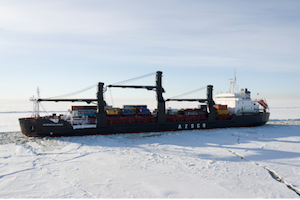Kazakhstan as an Arctic State and a Maritime Power
By Tristan Kenderdine
January 23, 2019, the CACI Analyst
The Ob’-Irtysh is the sixth largest river in the world by drainage area and sixth longest in the world at 5,410 kilometers. It is a broad and deep river, easily navigable by river barge, and also by sea-going vessels deep into the Eurasian continent. Geographically, this river system connects Kazakhstan to the Arctic Ocean, and if sufficient river maritime infrastructure were present then Kazakhstan could avoid the endogenous trade tariff that comes with being landlocked. This has massive implications for Kazakhstan’s potential trade, industry, and wider economic development.

EU–China trade to bolster security in the South Caucasus
By Boris Ajeganov
January 23, 2017, the CACI Analyst
Foreign investment in Georgia is strengthening the country’s importance in connecting East Asia with Europe, which has positive implications for the broader region. The rise in FDI in commercial and transportation infrastructure in combination with the signing of international free trade agreements will reduce Georgia’s vulnerability in terms of economic and, ultimately, ‘hard’ security. The growing importance of the South Caucasus as node for EU-China trade will weaken Russia’s incentives to undermine its southern neighbors by military, political, and economic means as it has done in the past. Accordingly, Tbilisi’s ability to conduct an independent foreign policy is set to improve despite the absence of Western security guarantees.
The Tashkent summit and the expanded SCO
By Farkhod Tolipov
July 27th, 2016, The CACI Analyst
50 years ago, Uzbekistan’s capital Tashkent hosted a summit ending the India-Pakistan war of 1965, resulting in the Tashkent Declaration. It was, so to speak, a Soviet “Camp David” aimed at bringing two antagonists – India and Pakistan – to peace. The SCO summit of June 2016 was, symbolically speaking, a second – multilateral – platform created in the same place, Tashkent, for the same two states to restore peace. Yet this summit did not appear to be a second Tashkent “Camp David,” but rather a challenge for the SCO itself.
Uzbekistan and South Korea: towards a special relationship
By Mirzokhid Rakhimov and Sung Dong Ki
June 10th, 2016, The CACI Analyst
South Korea’s Prime Minister Hwang Kyo-ahn visited Uzbekistan on May 19-20, 2016. The visit was the fifteenth official high-level meeting between the two countries. Over the last year, several new actors have increased their engagement with Central Asia, aside from South Korea also including Japan and India. South Korea is an important partner to the Central Asian republics, and especially to Uzbekistan. In May 2015, Islam Karimov made Seoul the destination of his first foreign visit after his reelection as president. The visit underscored the priority given to South Korea in Uzbekistan’s foreign policy. South Korea is among the largest investors in Uzbekistan’s economy, and cooperation is growing in education, tourism, cultural exchanges, and security.
China eyes Iran's potential as a trade corridor
By Sudha Ramachandran
May 26th, 2016, The CACI Analyst
Iran’s location near key trade routes and strategic waterways could make it a major Eurasian trade and transit corridor in the coming decades. China is keen to tap into Iran’s potential. But will Iran’s rise as a trade hub undermine the importance and prospects of the China-Pakistan Economic Corridor (CPEC)? This possibility has raised concerns in Pakistan that China’s commitment to making the Gwadar port a key node in the CPEC could dwindle as Iran’s trade corridors take shape and if Pakistan’s government fails to address China’s security concerns.






